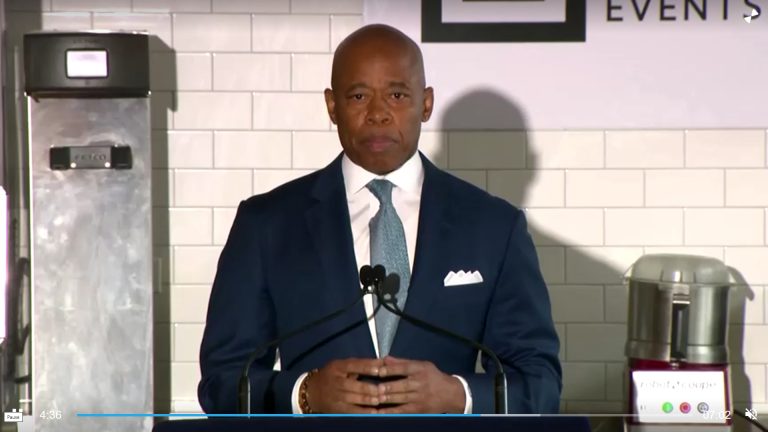New York top executives called on federal authorities to expedite the registration process for immigrants as the city’s asylum shelters are struggling under the influx of migrants bussed in from Texas.
At a news conference held on May 22 in Brooklyn’s Industry City warehouse complex, New York Mayor Eric Adams and state Governor Kathy Hochul urged federal officials to “expedite” the work authorization procedure for the thousands of immigrants who have entered the country in the previous year.
“More than anything, we need changes to the work authorization policies that will let these individuals not have to wait months, and possibly years, for that legal status. But let’s get it in an expedited basis,” Hochul said.
“So, we think it’s possible,” the governor added. Right now, you have to wait 180 days after you file for your legal asylum status. That is the big unknown. People come here. They’re desperate. They try to figure out how to just get on their feet. They don’t know the language.”
The city’s homeless shelters are buckling under the thousands of migrants bused from Texas into New York since last summer.
Success
You are now signed up for our newsletter
Success
Check your email to complete sign up
READ MORE:
- NYC Homeless Shelters Buckling Under the Weight of a Flood of Migrants Bused in From Texas
- From the Heart: MOIA Commissioner Shares Personal Immigration Journey Amid Surge in Asylum Seekers
- In New York, Health Coverage Now Available Regardless of Immigration Status Through NYC Care
- NY: GOP Minority Leaders Call on Gov. Hochul to Petition Biden on State of Emergency Over Migrant Crisis
Texas Governor Greg Abbott has been embroiled in a political joust with the Democratic mayors of several major cities like Chicago, Washington, DC, and New York busing out more and more migrants as retaliation for the federal government’s immigration policies at the southern border that allow a large volume of people to enter the country irrespective of their nationality or immigration status.
And by transferring the migrants to the major cities by bus, Abbott also transfers the problem, of course, to a higher national level.
Adams framed the problem in terms of offering support for asylum seekers.
“When I speak with my asylum seekers at the hotels, on the streets, they say, clearly, ‘We don’t want your free room and board, and food, and clothing. We want to work. We want to have an opportunity to provide for ourselves,'” Adams said.
“And right now, we are denying that opportunity by refusing to let them work legally,” Adams continued.
U.S. immigration policy allows foreigners to seek asylum for reasons such as religious or political persecution.
The immigration process, overseen by the U.S. Citizenship and Immigration Services (USCIS) is convoluted and lengthy, with the agency being chronically underfunded and reliant wholly on fees paid by legal immigrants.
Not enough judges to process immigrants
While immigrants are unlikely to be granted asylum for economic hardship — which is the category that the vast majority of arrivals at the southern border fall into — applying for asylum tends to get them an automatic “foot in the door” as USCIS must process their cases before a decision can be made on whether they can stay in the U.S. or not.
Hochul emphasized that there were not enough civil servants, particularly judges, to handle the influx of migrants.
“We don’t have enough judges here in the state of New York. So, start sending some judges up and the clerical staff, give us the support we need so they can start properly filling out the asylum process.”
“New York City is the number one destination for asylum seekers who have been released from federal custody who are awaiting their next steps in the process. Now we know why,” she said.
Meanwhile, Hochul noted that there were over 42,000 migrants sheltered in New York City thanks to “the compassion of the people here in New York” during this “humanitarian crisis.”
Reuters contributed to this report.
















